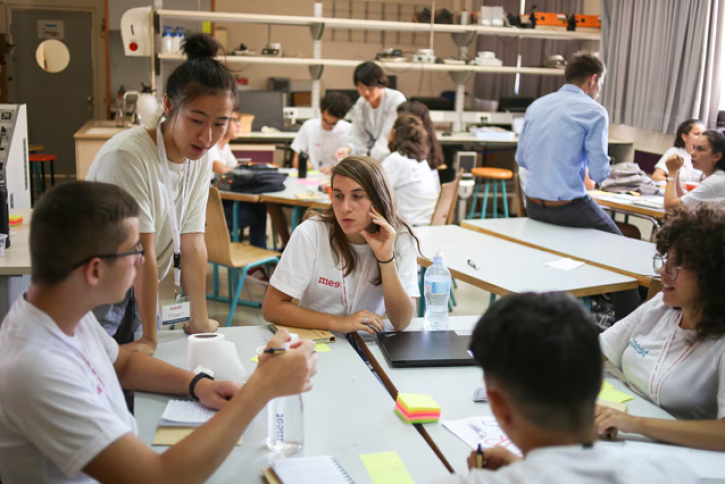
Israeli and Palestinian participants in the MEET program work together on technological and entrepreneurial projects.
Madian Marana, a Palestinian citizen of Israel, grew up in an Arab town in northern Israel, curious about what she calls “the other side” — Jewish Israelis.
Her town’s school did not have any Jewish students, but Marana, 17, was still drawn to do what most of her friends from town would not dare — speak with Jewish Israelis. Now, she’s not only speaking with “the other side,” she’s ready to go into business with them.
Marana is one of hundreds of Palestinian and Israeli high school students who each year participate in the Middle East Entrepreneurs of Tomorrow program, or MEET, an MIT initiative based in Jerusalem that teaches computer science and innovation while promoting intercultural dialogue.
The 20-year-old program has nearly 1,000 alumni pursuing careers in tech and entrepreneurship, doing policy work in government and nongovernment organizations, or earning degrees at universities such as MIT and Harvard. Some 94 percent of MEET’s participants said they are willing to work with people from the other nationality.
“Seeing Jewish Israeli peers as friends,” said Marana, “is a way to go beyond the socialization we go through when we’re older, that they are the enemy.”
In an embattled Middle East, hope sounds like a false promise. But MEET and another program with Greater Boston roots, 50:50 Startups, are trying to bridge the social, economic, and ideological divide through innovation and entrepreneurship. In each program, the idea is to create connection and understanding through shared professional interests, dialogue, and teamwork.
“We care about achieving practical technological pathways that would benefit all of us as humans living here,” said Shai Friedman, 50:50’s chief executive.
Amid the decades-old conflict, the two organizations emerged from university campuses to offer their own approach to Israeli and Palestinian coexistence. MEET was founded by three Israeli students at MIT and Harvard during the second Intifada in 2004 — an escalation of the conflict characterized by suicide bombings in civilian populations in Israel and an aggressive Israeli military operation in Palestinian villages in the West Bank.
The founders recognized an urgent need for peacemaking, and collaborated with MIT’s International Science and Technology Initiative, the school’s global engagement program, to encourage Israelis and Palestinian youth to work together on technology projects.
“Many of the kids don’t come to the program because they want to be agents of peace,” said Yaniv Sagee, MEET’s chief executive. “They come because they see it’s part of MIT and know this can transform their lives.”

